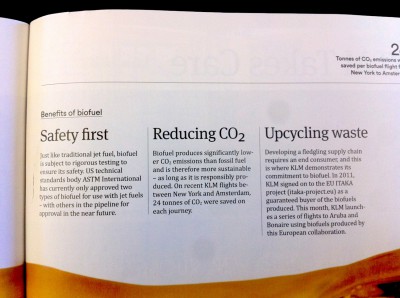A friend of mine recently told me that he hasn’t taken a plane flight since 1997. “It’s literally the worst thing you can do for the environment,” he said. I’m aware of that fact, but I couldn’t believe that he had reached this level of commitment. The possibility of not taking an airplane ever, despite norms and convenience and in-flight movies and the future and business class and technology and _____, had literally never occurred to me. What kind of conformist automaton must I be? When he told me this I got a similar feeling to when my coworker told me she was going on the Master Cleanse (a ten-day diet of only a honey/lemon/cayenne pepper) – total awe and then deep guilt and then seething jealousy. There is no way I could spend ten days not eating, much less not drinking beer and whiskey. Or could I? And why did the no-plane announcement inspire exactly the same emotional reaction?
I’m sitting in Tegel airport on my way to Amsterdam. I spent an hour or two agonizing over the train and plane schedules last week before booking the flight. I’m telling myself I chose the plane because the company I work for is paying for this trip, and the only train ticket under budget would have required traveling all night on Saturday and arriving in Berlin at 4am. I told myself this was impossible because it will take a toll on my Sunday productivity, plus I have sleeping problems already due to this endless “stress” situation, which has become so constant and grating that I can barely see my hands in front of my face. How many hours of lost sleep are worth ___ tons of fossil fuel? How important is my company’s money? How bad would it be for me to over-spend? Couldn’t I pay the extra travel fees, a paltry 20 euros?
This is the kind of moral balancing act that makes daily decisions so bewildering. You’re in the grocery store and you have a mission: buy healthy (less carbs, less meat, less peanut butter, less beer), buy cheaply (no bio-laden, no fancy produce, no refined granola), and buy responsibly (no meat, no imported products, no canned tuna). But you don’t know the authority who can guarantee, 100%, which items qualify for any of these categories, you left your iPhone at home and you don’t remember the most recent scare-article you read, and you don’t know what you are left with if you avoid all three categories of bad stuff.
Lately I go shopping and I fuck up on purpose out of frustration, buying loads of pasta and bacon. (Kudos to the old guy drinking a beer at 11am in the airport right now next to me.) The more I indulge and disregard the Categories of Responsibility, the more I’m like fuck it, gonna shop at H&M now, gonna spend 50euros on a taxi, gonna use a ton of toilet paper for no reason – or as the case may be, gonna buy this plane ticket to Amsterdam for a two-day conference on the critical/political potential of design. The press materials of the conference announce a running theme of sustainability in various forms. I got a welcome email yesterday listing the speakers coming from around the world to participate. I wonder if any of them took a boat instead of an airliner.

I’ve come to associate responsibility with dogma and lifestyle politics to the extent that they almost disgust me. Tino Seghal bringing whole troups of performers on week-long boat trips to avoid transatlantic flights, Jonathan Safran Foer’s book about raising his kids vegetarian – these cases incite such a nasty guilt in me that I mock them as fanatics. Wrong Response. Going through security I realized that the few hours I’m saving and convenience I’m gaining are most certainly not balance-able with the guilt. The problem is that a long time ago I decided to categorically refuse to make decisions in my daily life based solely on guilt. Otherwise I end up doing a ton of jobs for free, stretching myself too thin between my friends, showing up at 30 art openings a week, and ending up hating everyone. And since the guilt I feel for fucking up the environment is the exact same type of guilt I feel for not going to your theater play, because jet fuel = master cleanse, I have no idea how to differentiate or to prioritize between my actions. It also allows me to perform a game of checks and balances: If you don’t eat any sugar this week, you can take taxis on the weekend. If you leave work early, you can’t watch TV later. And so on.
Why should excessive partying on the weekend, water usage, procrastination, hamburgers, and plane travel all be leveled to the same playing field of moral decisions? How could one draw up a scale or a ranking system for most repugnant to most commendable? If somebody can send me a graph I will be very grateful.
But with or without the numbers, these responsibilities are so abstract: I will never be able to tangibly understand how much my expenditure of resources contributes to global decline. Plus nobody seems to care if I gain a few kilos or blow too much cash or zoom around in an SUV – not even my impressively responsible non-flying, vegetarian friend, who is thankfully undogmatic about his belief system. Guilt is all I have to cling to in order to incite me to action, or stifle me into non-action. Guilt, guide me.
*
*
*
*I wrote this four days ago. The design conference is now over and my mind has been blown way out of the guilt stratosphere. More to come on that somewhere soon.
*
*
⁝⁞⁝⁞ʕु•̫͡•ʔु☂⁝⁞⁝⁝ *
*
*




